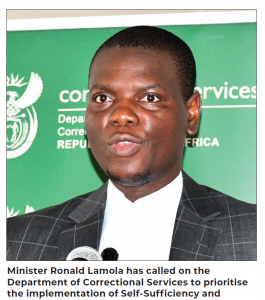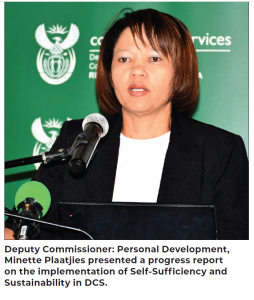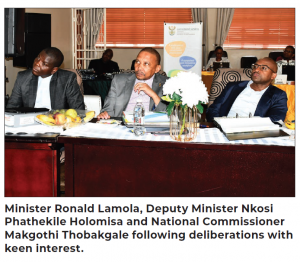Minister of Justice and Correctional Services, Ronald Lamola used his address, on Wednesday, 7 December 2022, at the ongoing 3-day Department of Correctional Services (DCS) Annual Strategic Planning Session to remind senior managers that the successful implementation of the Self-Sufficiency and Sustainability Strategic Framework (SSSF) is non-negotiable. 
The session kicked-off with National Commissioner, Makgothi Thobakgale providing a recap of the previous day’s deliberations, with particular focus on the salient issues.
Minister Lamola, who was accompanied by Deputy Minister Nkosi Phathekile Holomisa, said that the SSSF is a legacy defining and priority delivery area for the 6th administration. To this end, the Minister directed Management to build on the successes achieved thus far as recorded in the inaugural Annual Report on Self-Sufficiency and Sustainability in DCS. “The report clearly outlined savings, as a result of self-sufficiency. However, more work still needs to be done,” he commented.
Minister Lamola said that, if the lofty ambitions as encapsulated in the DCS Vision 2068 Strategic Planning Report are to be realised, the Department must adopt and deepen a culture of meritocracy in order to attract and retain talent in the organisation. 
Among other issues, the Minister called on managers to immerse themselves in critical discussions on the efficacy of the country’s parole regime, with the objective of refining its processes so as to restore the confidence of society in the system. He also identified the need for DCS to deepen its working ties with sister departments to promote victim empowerment in line with the country’s victim-centric justice system approach. “Often, we are accused of neglecting victims of crime in our operations. The session must provide reasonable and strategic interventions to ensure that victims are empowered. This will go a long way in demystifying misconceptions that we care less about victims,” directed Minister Lamola.
The Minister further directed Management to amplify efforts to ensure the training of offenders, including improving the uptake of offenders into educational programmes, particularly female offenders. He charged the National Commissioner and Management to come up with measures to proactively manage security incidents. “I want the session to spend a great time on resolving the issue of security,” he said.
He also called on Management to give urgent attention to the dilapidated state of officials’ residential quarters and ensure that officials live in habitable conditions.
Minister Lamola also flagged the following issues for Management to look into:
• Appointment of technicians;
• Expeditious and effective implementation of consequence management;
• DCS to modernize and adapt to technology;
• Eliminate audit findings and maintain the trajectory towards a clean audit outcome;
• Enhance cooperation with stakeholders such as the United Nations Office on Drugs and Crime (UNODC) as well as organized labour; and
• Intensify the rollout of wellness programmes to improve the general wellbeing of officials.
Deputy Minister Holomisa echoed the Minister’ sentiments and impressed on Management the need to forge strategic partnerships with stakeholders in the spheres of rehabilitation, skills development and self-sustainability. He added that the Department should endeavour to expand its work with traditional leaders to ensure that traditional councils become points of contact for on-going services rendered by parolees and probationers. “As the Department, we must urge Traditional Leaders to embrace reintegration initiatives because these are practical initiatives rendering real changes that we make to the daily conditions in which people live and such is essential to their dignity,” he said. The Deputy Minister further called on the Department to fully exploit the 40 000 hectares of land under its custodianship, to ensure self-sustenance and to contribute to the country’s food basket.
Deputy Minister Holomisa hailed the recent launch of Rehabilitation Programmes for Remand Detainees, adding that this will ensure that the needs of this cohort of the offender population are catered for. “Amongst the programmes offered are those targeting domestic violence and its impact, which will assist the country to also address the issues of Gender-Based Violence and Femicide (GBVF) in our communities,” he said.
Following the address of the apex leaders, the meeting continued to be engrossed in deliberations with a particular focus on the following thematic areas:
• Annual review on the progress of the SSSF;
• Efficiency of the Parole system with regards to Lifers;
• Progress in the implementation of the Social Reintegration Framework;
• Progress in implementation of strategic risks mitigation plans; and
• Progress on the implementation of the Master Information Systems and Security Technology Plan (MISSTP)
This was followed by breakaway commissions where managers congregated in smaller groups to interrogate and propose remedial measures to cure deficiencies in different areas of the organisations’ operations.
